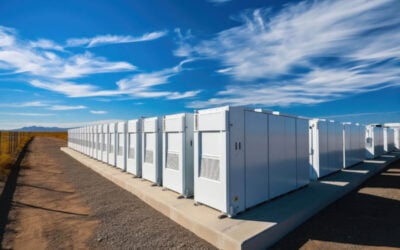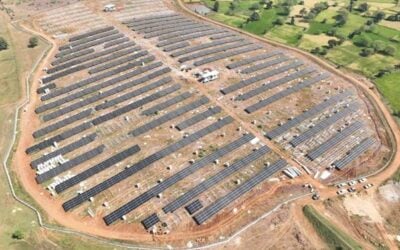
Duke Energy has installed its first solar-and-battery microgrid capable of powering an entire town in North Carolina, while a mixed technology microgrid will add resilience to a new hub at JFK Airport.
Utility Duke Energy said last week that it has placed into service the renewable energy microgrid at a small town in Madison County called Hot Springs, about 170 miles from Duke Energy’s own HQ in Charlotte, North Carolina.
Enjoy 12 months of exclusive analysis
- Regular insight and analysis of the industry’s biggest developments
- In-depth interviews with the industry’s leading figures
- Annual digital subscription to the PV Tech Power journal
- Discounts on Solar Media’s portfolio of events, in-person and virtual
Wärtsilä supplied the 4.4MW battery storage system and energy management system (EMS), which is central to the microgrid’s operation, along with its 2MWac solar PV array. The system enables the town, which has a population of just over 500, to continue using power even if the single line transporting electricity from the main grid fails.
In daily operation, the PV and battery energy storage system (BESS) will provide ramping support and capacity to the grid during peaks in demand, and will provide balancing services like frequency and voltage regulation.
During a testing phase, the entire Hot Springs load was able to be black started by the microgrid i.e., the solar and BESS restored power to the whole town without intervention from the grid.
“The Hot Springs inverter-only-based community microgrid is a great step forward for Duke Energy and our customers. This project has reduced the need for equipment upgrades in an environmentally sensitive area,” Jason Handley, Duke Energy’s general manager for distributed energy said.
“We are using lessons learned from this first-of-its-kind installation to take to our other microgrids under construction in Indiana and Florida. At a larger scale, microgrids bring more resiliency to the energy grid for our customers.”
While Duke already has some 60MW of microgrids and battery storage in service, this is the first instance of it deploying a microgrid that can power an entire town, Handley said.
Microgrids can help integrate higher shares of renewable energy onto the grid while enhancing reliability of supply, and keeping costs to billpayers low, the Duke Energy representative said.
Duke Energy’s integrated plan for its Carolina’s service areas, submitted to regulators in May last year, calls for the utility by 2030 to deploy or procure 3,700MW to 5,900MW of energy storage.
Energy-as-a-service microgrid for New York’s JFK Airport NTO
A new terminal being built at New York’s John F. Kennedy International Airport will be equipped with a mixed technology microgrid that will enable departure gates to be powered independently of the grid.
Shortly before the end of last month, energy-as-a-service (EaaS) company AlphaStruxure said that it had been selected to design, build and operate the integrated microgrid infrastructure at JFK Airport’s New Terminal One (NTO).
The project is being described as a 11.34MW microgrid. It will include 7.66MW of rooftop solar PV, with solar on “all available and viable rooftop spaces,” along with 2MW/4MWh of battery storage and 3.68MW of fuel cells as well as a smart water heating system, which will recover waste heat.
It will be designed so that airport operations can go on even during power disruptions, including restaurants, lounges and other facilities in addition to gates. NTO is expected to commence operations in stages in 2026 and will be fully built by 2030.
AlphaStruxure is a joint venture (JV) that was set up by investment firm Carlyle and automation and energy management company Schneider Electric. As that might imply, Carlyle will finance the project and Schneider will provide the microgrid technology, including software and associated services.
AlphaStruxure develops, designs and builds projects like this to own and operate, contracting for their use on an EaaS basis, meaning the customer pays no upfront cost and gets predictable operating costs and performance guarantees.
“This project is paving the way for all transportation hubs and municipalities across the country,” AlphaStruxure CEO Juan Macias said.
“Not only is it about resilient energy, it’s about decarbonisation, risk transfer, and cost predictability via the Energy as a Service business model.”
While decarbonisation of aviation itself appears to be a tall order challenge without a clear near-term solution to aim for, though many are working on it, this is the latest in a number of projects to decarbonise ground operations
Energy-Storage.news’ publisher Solar Media will host the 5th Energy Storage Summit USA, 28-29 March 2023 in Austin, Texas. Featuring a packed programme of panels, presentations and fireside chats from industry leaders focusing on accelerating the market for energy storage across the country. For more information, go to the website.






